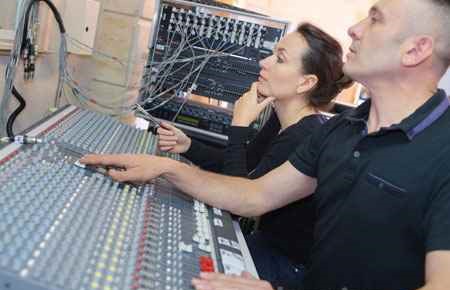
Announcer
Summary
Announcers present music, news, and sports and may provide commentary or interview guests.
What they do
Announcers present music, news, and sports and may provide commentary or interview guests about these other important topics. Some act as masters of ceremonies (emcees) or disc jockeys (DJs) at weddings, parties, or clubs.
Announcers typically do the following:
- Present music, news, sports, the weather, the time, and commercials
- Interview guests and moderate panels or discussions on their shows
- Announce station programming information, such as program schedules, station breaks for commercials, or public service information
- Research topics for comment and discussion during shows
- Read prepared scripts on radio or television shows
- Comment on important news stories
- Provide commentary for the audience during sporting events, at parades, and on other occasions
- Select program content
- Introduce upcoming acts and guide the audience through the entertainment
- Make promotional appearances at public or private events
Work Environment
Radio and television announcers usually work in well-lit, air-conditioned, soundproof studios. Some radio DJs can produce and record their shows while working from home. The pressure of deadlines and tight work schedules can be stressful.
How to become an Announcer
Educational requirements for announcers vary. Radio and television announcers typically need a bachelor’s degree in journalism, broadcasting, or communications, along with other experience gained from internships or working at their college radio or television station. Public address announcers typically need a high school diploma with some short-term on-the-job training.
Public address announcers typically need a high school diploma or equivalent. Radio and television announcers typically need a bachelor’s degree in communications, broadcasting, or journalism, but some jobs require only a high school diploma or equivalent.
College broadcasting programs offer courses, such as voice and diction, to help students improve their vocal qualities. In addition, these programs prepare students to work with the computer and audio equipment and software used at radio and television studios.
Public address system and other announcers typically need short-term on-the-job training upon being hired. This training allows these announcers to become familiar with the equipment they will use during sporting and entertainment events. For sports public address announcers, training also may include basic rules and information for the sports they are covering.
Radio and television announcers whose highest level of education is a high school diploma or equivalent may also need some short-term on-the-job training to learn to operate audio and production equipment.
Pay
The median annual wage for broadcast announcers and radio disc jockeys was $34,630 in May 2019. The median wage is the wage at which half the workers in an occupation earned more than that amount and half earned less. The lowest 10 percent earned less than $19,330, and the highest 10 percent earned more than $105,180.
The median annual wage for media and communication workers, all other was $47,580 in May 2019. The lowest 10 percent earned less than $22,820, and the highest 10 percent earned more than $92,660.
Job Outlook
Overall employment of announcers is projected to grow 1 percent from 2019 to 2029, slower than the average for all occupations. Projected employment change varies by occupation.
Similar Job Titles
Anchor, Announcer, DJ (Disc Jockey), Host, Meteorologist, Morning Show Host, News Anchor, Radio Announcer, Sports Director, Television News Anchor (TV News Anchor)
Related Occupations
Broadcast News Analyst, Reporter and Correspondent, Copy Writer, Film and Video Editor, Tour Guide and Escort
More Information
The trade associations listed below represent organizations made up of people (members) who work and promote advancement in the field. Members are very interested in telling others about their work and about careers in those areas. As well, trade associations provide opportunities for organizational networking and learning more about the field’s trends and directions.
- American Disc Jockey Association - This organization’s goal is to deliver accurate information to the consumer so they make an educated decision when hiring a professional disc jockey.
Magazines and Publications
- The Announcer Magazine (on fb)
Part researcher and part public personality, announcers and disc jockeys—or DJs— use writing skills and a pleasant speaking voice to share news and information with the public. Broadcast announcers and radio DJs present music or the news and comment on important current events. Announcers who host talk shows usually research and discuss issues with guests and audience members in a subject such as politics, personal finance, sports, or health. Announcers and DJs schedule guests for their shows, maintain a social media presence to encourage a following, and develop other creative content such as contests and events. They also give updates on weather and traffic conditions. Some work as sports team announcers, party DJs, and event MCs, providing background information and entertaining the audience or detailing the event as it unfolds for the listening audience. Broadcast announcers and radio disc jockeys usually work full-time schedules in soundproof studios. Shows are usually recorded during the day for later broadcast or podcasts, but some announcers broadcast live, and may work late night hours, weekends or holidays. Deadlines and tight work schedules are common in these fields. Broadcast announcers and radio DJs typically need a bachelor’s degree in journalism, broadcasting, or communications to enter the field, but some jobs may not emphasize educational requirements. They typically need previous experience gained from internships or from working at a college radio or television station.
Content retrieved from: US Bureau of Labor Statistics-OOH www.bls.gov/ooh,
CareerOneStop www.careeronestop.org, O*Net Online www.onetonline.org
